Comparative Business Ethics and Social Responsibility: Wells Fargo
VerifiedAdded on 2023/06/11
|12
|2685
|448
Essay
AI Summary
This essay provides a comprehensive analysis of the Wells Fargo business ethics case, focusing on the ethical issues and social responsibility concerns raised by the company's actions. It summarizes the arguments made in a recent news article, including the legal and sanction implications, and discusses key ethical issues such as corporate governance, social responsibility, corporate citizenship, and leadership. The essay evaluates the ethical decisions made, comparing them to other cases, and outlines the ethical decision-making processes, aligning opinions with relevant moral philosophies such as confidentiality, truthfulness, autonomy, informed consent, and common good. The analysis concludes that the ethical dilemmas outlined can help managers make more informed decisions, with the paper referencing academic sources and including the original news article as an appendix. Desklib provides access to similar solved assignments for students.
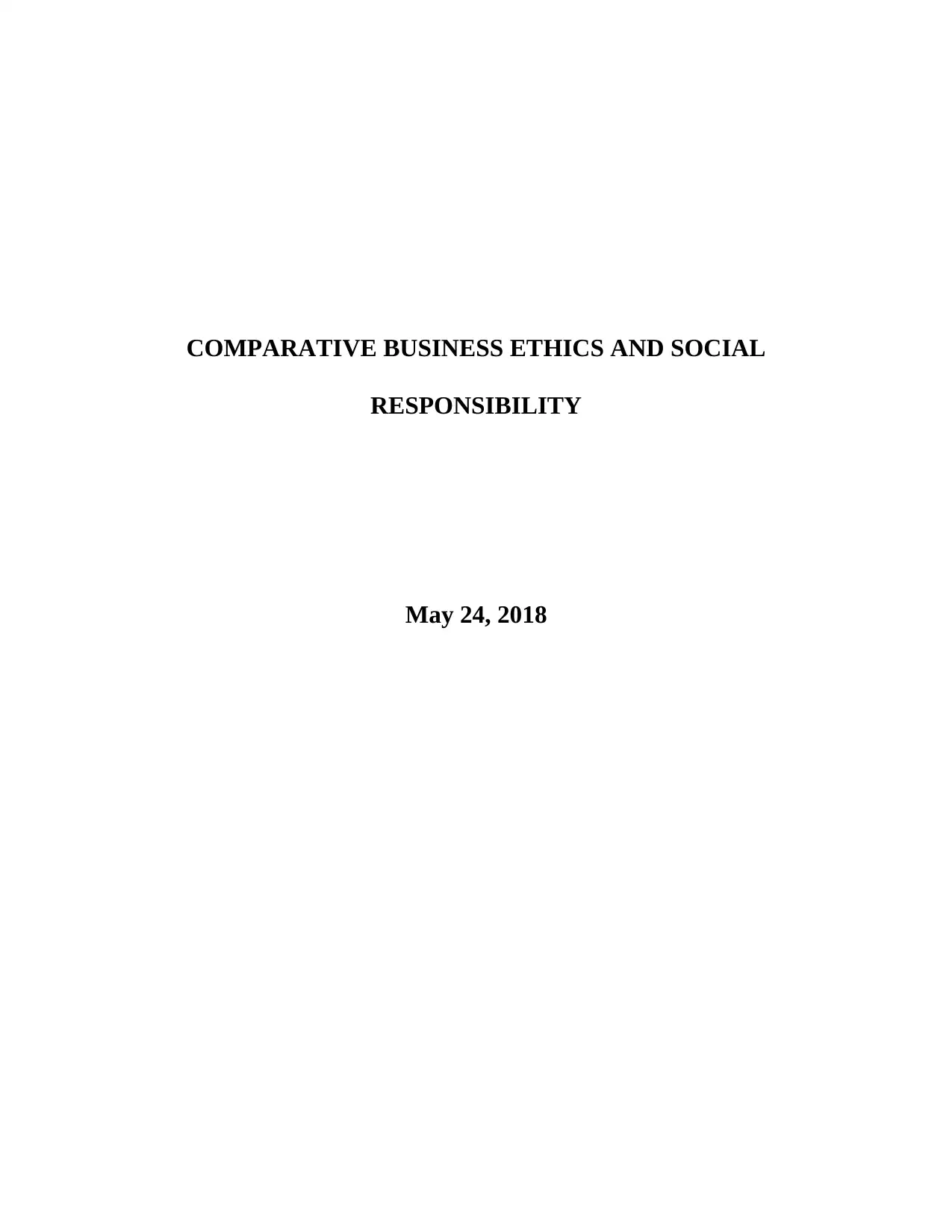
COMPARATIVE BUSINESS ETHICS AND SOCIAL
RESPONSIBILITY
May 24, 2018
RESPONSIBILITY
May 24, 2018
Paraphrase This Document
Need a fresh take? Get an instant paraphrase of this document with our AI Paraphraser
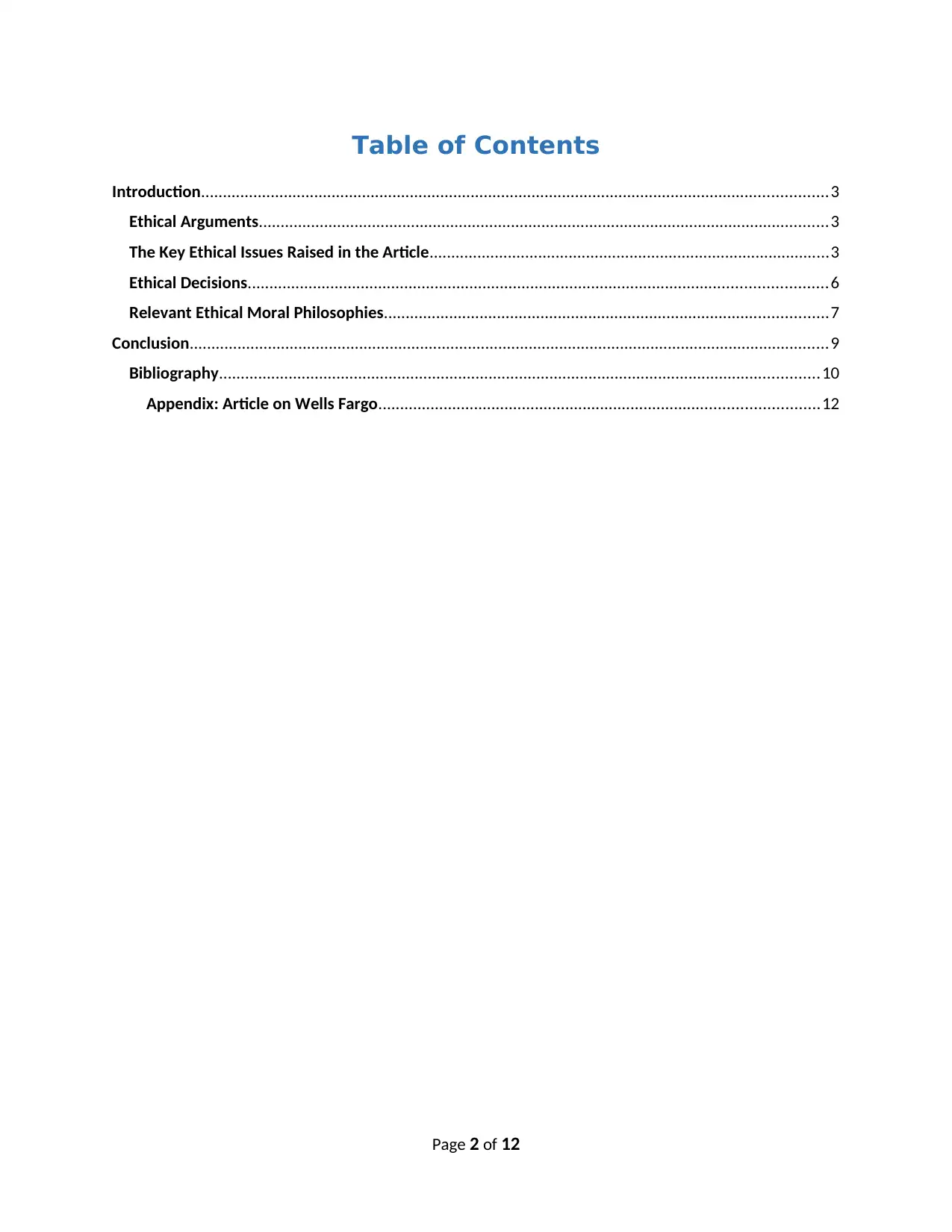
Table of Contents
Introduction................................................................................................................................................3
Ethical Arguments...................................................................................................................................3
The Key Ethical Issues Raised in the Article............................................................................................3
Ethical Decisions.....................................................................................................................................6
Relevant Ethical Moral Philosophies......................................................................................................7
Conclusion...................................................................................................................................................9
Bibliography..........................................................................................................................................10
Appendix: Article on Wells Fargo.....................................................................................................12
Page 2 of 12
Introduction................................................................................................................................................3
Ethical Arguments...................................................................................................................................3
The Key Ethical Issues Raised in the Article............................................................................................3
Ethical Decisions.....................................................................................................................................6
Relevant Ethical Moral Philosophies......................................................................................................7
Conclusion...................................................................................................................................................9
Bibliography..........................................................................................................................................10
Appendix: Article on Wells Fargo.....................................................................................................12
Page 2 of 12
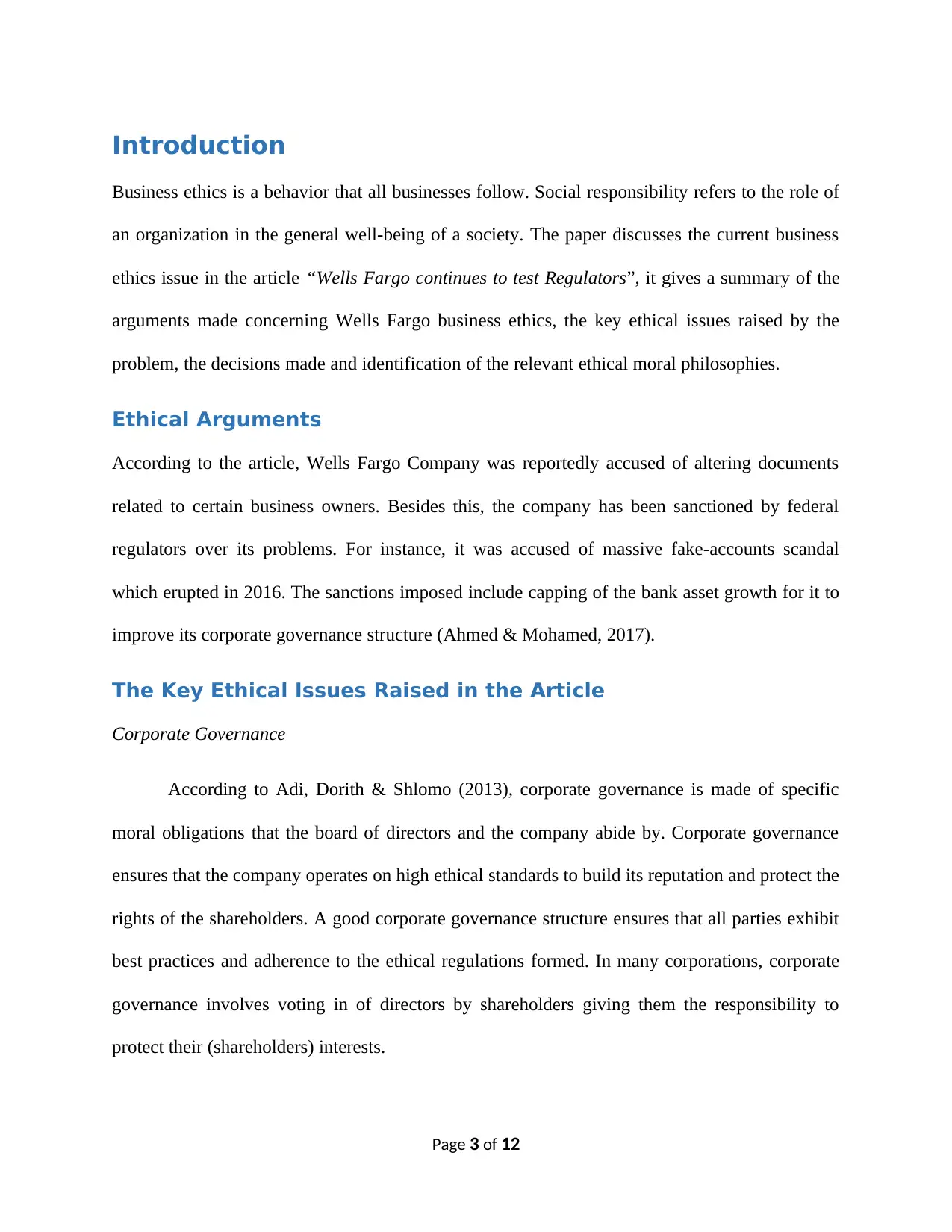
Introduction
Business ethics is a behavior that all businesses follow. Social responsibility refers to the role of
an organization in the general well-being of a society. The paper discusses the current business
ethics issue in the article “Wells Fargo continues to test Regulators”, it gives a summary of the
arguments made concerning Wells Fargo business ethics, the key ethical issues raised by the
problem, the decisions made and identification of the relevant ethical moral philosophies.
Ethical Arguments
According to the article, Wells Fargo Company was reportedly accused of altering documents
related to certain business owners. Besides this, the company has been sanctioned by federal
regulators over its problems. For instance, it was accused of massive fake-accounts scandal
which erupted in 2016. The sanctions imposed include capping of the bank asset growth for it to
improve its corporate governance structure (Ahmed & Mohamed, 2017).
The Key Ethical Issues Raised in the Article
Corporate Governance
According to Adi, Dorith & Shlomo (2013), corporate governance is made of specific
moral obligations that the board of directors and the company abide by. Corporate governance
ensures that the company operates on high ethical standards to build its reputation and protect the
rights of the shareholders. A good corporate governance structure ensures that all parties exhibit
best practices and adherence to the ethical regulations formed. In many corporations, corporate
governance involves voting in of directors by shareholders giving them the responsibility to
protect their (shareholders) interests.
Page 3 of 12
Business ethics is a behavior that all businesses follow. Social responsibility refers to the role of
an organization in the general well-being of a society. The paper discusses the current business
ethics issue in the article “Wells Fargo continues to test Regulators”, it gives a summary of the
arguments made concerning Wells Fargo business ethics, the key ethical issues raised by the
problem, the decisions made and identification of the relevant ethical moral philosophies.
Ethical Arguments
According to the article, Wells Fargo Company was reportedly accused of altering documents
related to certain business owners. Besides this, the company has been sanctioned by federal
regulators over its problems. For instance, it was accused of massive fake-accounts scandal
which erupted in 2016. The sanctions imposed include capping of the bank asset growth for it to
improve its corporate governance structure (Ahmed & Mohamed, 2017).
The Key Ethical Issues Raised in the Article
Corporate Governance
According to Adi, Dorith & Shlomo (2013), corporate governance is made of specific
moral obligations that the board of directors and the company abide by. Corporate governance
ensures that the company operates on high ethical standards to build its reputation and protect the
rights of the shareholders. A good corporate governance structure ensures that all parties exhibit
best practices and adherence to the ethical regulations formed. In many corporations, corporate
governance involves voting in of directors by shareholders giving them the responsibility to
protect their (shareholders) interests.
Page 3 of 12
⊘ This is a preview!⊘
Do you want full access?
Subscribe today to unlock all pages.

Trusted by 1+ million students worldwide
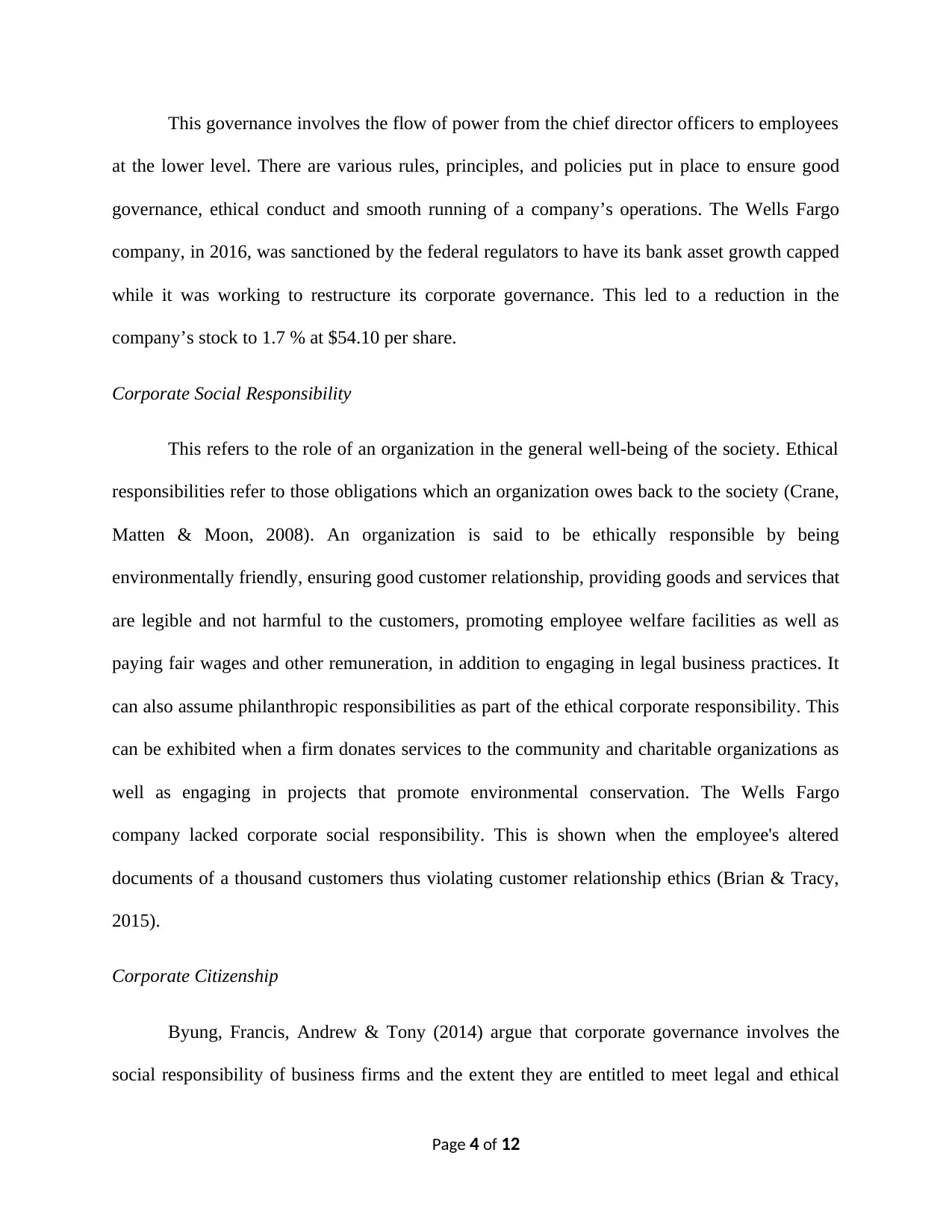
This governance involves the flow of power from the chief director officers to employees
at the lower level. There are various rules, principles, and policies put in place to ensure good
governance, ethical conduct and smooth running of a company’s operations. The Wells Fargo
company, in 2016, was sanctioned by the federal regulators to have its bank asset growth capped
while it was working to restructure its corporate governance. This led to a reduction in the
company’s stock to 1.7 % at $54.10 per share.
Corporate Social Responsibility
This refers to the role of an organization in the general well-being of the society. Ethical
responsibilities refer to those obligations which an organization owes back to the society (Crane,
Matten & Moon, 2008). An organization is said to be ethically responsible by being
environmentally friendly, ensuring good customer relationship, providing goods and services that
are legible and not harmful to the customers, promoting employee welfare facilities as well as
paying fair wages and other remuneration, in addition to engaging in legal business practices. It
can also assume philanthropic responsibilities as part of the ethical corporate responsibility. This
can be exhibited when a firm donates services to the community and charitable organizations as
well as engaging in projects that promote environmental conservation. The Wells Fargo
company lacked corporate social responsibility. This is shown when the employee's altered
documents of a thousand customers thus violating customer relationship ethics (Brian & Tracy,
2015).
Corporate Citizenship
Byung, Francis, Andrew & Tony (2014) argue that corporate governance involves the
social responsibility of business firms and the extent they are entitled to meet legal and ethical
Page 4 of 12
at the lower level. There are various rules, principles, and policies put in place to ensure good
governance, ethical conduct and smooth running of a company’s operations. The Wells Fargo
company, in 2016, was sanctioned by the federal regulators to have its bank asset growth capped
while it was working to restructure its corporate governance. This led to a reduction in the
company’s stock to 1.7 % at $54.10 per share.
Corporate Social Responsibility
This refers to the role of an organization in the general well-being of the society. Ethical
responsibilities refer to those obligations which an organization owes back to the society (Crane,
Matten & Moon, 2008). An organization is said to be ethically responsible by being
environmentally friendly, ensuring good customer relationship, providing goods and services that
are legible and not harmful to the customers, promoting employee welfare facilities as well as
paying fair wages and other remuneration, in addition to engaging in legal business practices. It
can also assume philanthropic responsibilities as part of the ethical corporate responsibility. This
can be exhibited when a firm donates services to the community and charitable organizations as
well as engaging in projects that promote environmental conservation. The Wells Fargo
company lacked corporate social responsibility. This is shown when the employee's altered
documents of a thousand customers thus violating customer relationship ethics (Brian & Tracy,
2015).
Corporate Citizenship
Byung, Francis, Andrew & Tony (2014) argue that corporate governance involves the
social responsibility of business firms and the extent they are entitled to meet legal and ethical
Page 4 of 12
Paraphrase This Document
Need a fresh take? Get an instant paraphrase of this document with our AI Paraphraser
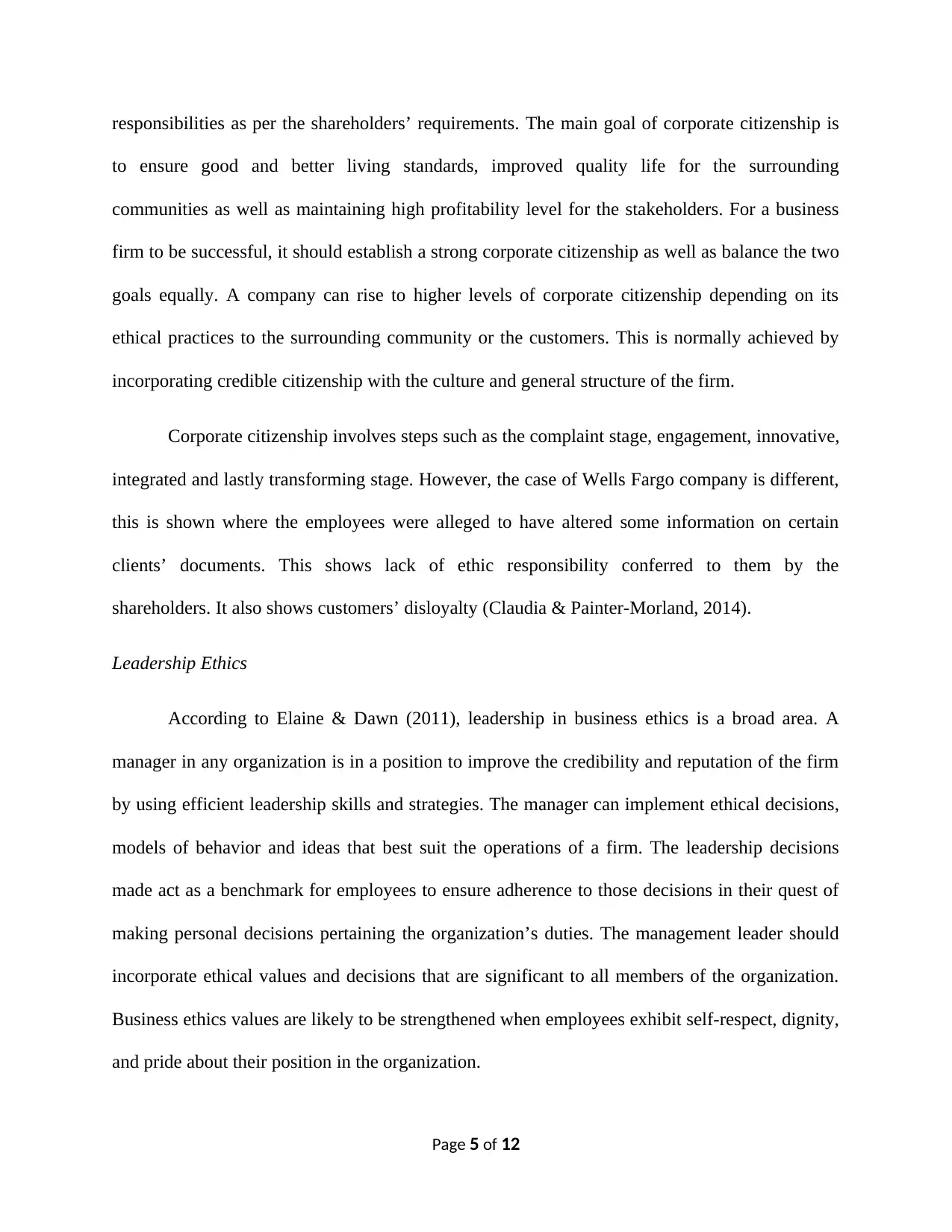
responsibilities as per the shareholders’ requirements. The main goal of corporate citizenship is
to ensure good and better living standards, improved quality life for the surrounding
communities as well as maintaining high profitability level for the stakeholders. For a business
firm to be successful, it should establish a strong corporate citizenship as well as balance the two
goals equally. A company can rise to higher levels of corporate citizenship depending on its
ethical practices to the surrounding community or the customers. This is normally achieved by
incorporating credible citizenship with the culture and general structure of the firm.
Corporate citizenship involves steps such as the complaint stage, engagement, innovative,
integrated and lastly transforming stage. However, the case of Wells Fargo company is different,
this is shown where the employees were alleged to have altered some information on certain
clients’ documents. This shows lack of ethic responsibility conferred to them by the
shareholders. It also shows customers’ disloyalty (Claudia & Painter-Morland, 2014).
Leadership Ethics
According to Elaine & Dawn (2011), leadership in business ethics is a broad area. A
manager in any organization is in a position to improve the credibility and reputation of the firm
by using efficient leadership skills and strategies. The manager can implement ethical decisions,
models of behavior and ideas that best suit the operations of a firm. The leadership decisions
made act as a benchmark for employees to ensure adherence to those decisions in their quest of
making personal decisions pertaining the organization’s duties. The management leader should
incorporate ethical values and decisions that are significant to all members of the organization.
Business ethics values are likely to be strengthened when employees exhibit self-respect, dignity,
and pride about their position in the organization.
Page 5 of 12
to ensure good and better living standards, improved quality life for the surrounding
communities as well as maintaining high profitability level for the stakeholders. For a business
firm to be successful, it should establish a strong corporate citizenship as well as balance the two
goals equally. A company can rise to higher levels of corporate citizenship depending on its
ethical practices to the surrounding community or the customers. This is normally achieved by
incorporating credible citizenship with the culture and general structure of the firm.
Corporate citizenship involves steps such as the complaint stage, engagement, innovative,
integrated and lastly transforming stage. However, the case of Wells Fargo company is different,
this is shown where the employees were alleged to have altered some information on certain
clients’ documents. This shows lack of ethic responsibility conferred to them by the
shareholders. It also shows customers’ disloyalty (Claudia & Painter-Morland, 2014).
Leadership Ethics
According to Elaine & Dawn (2011), leadership in business ethics is a broad area. A
manager in any organization is in a position to improve the credibility and reputation of the firm
by using efficient leadership skills and strategies. The manager can implement ethical decisions,
models of behavior and ideas that best suit the operations of a firm. The leadership decisions
made act as a benchmark for employees to ensure adherence to those decisions in their quest of
making personal decisions pertaining the organization’s duties. The management leader should
incorporate ethical values and decisions that are significant to all members of the organization.
Business ethics values are likely to be strengthened when employees exhibit self-respect, dignity,
and pride about their position in the organization.
Page 5 of 12
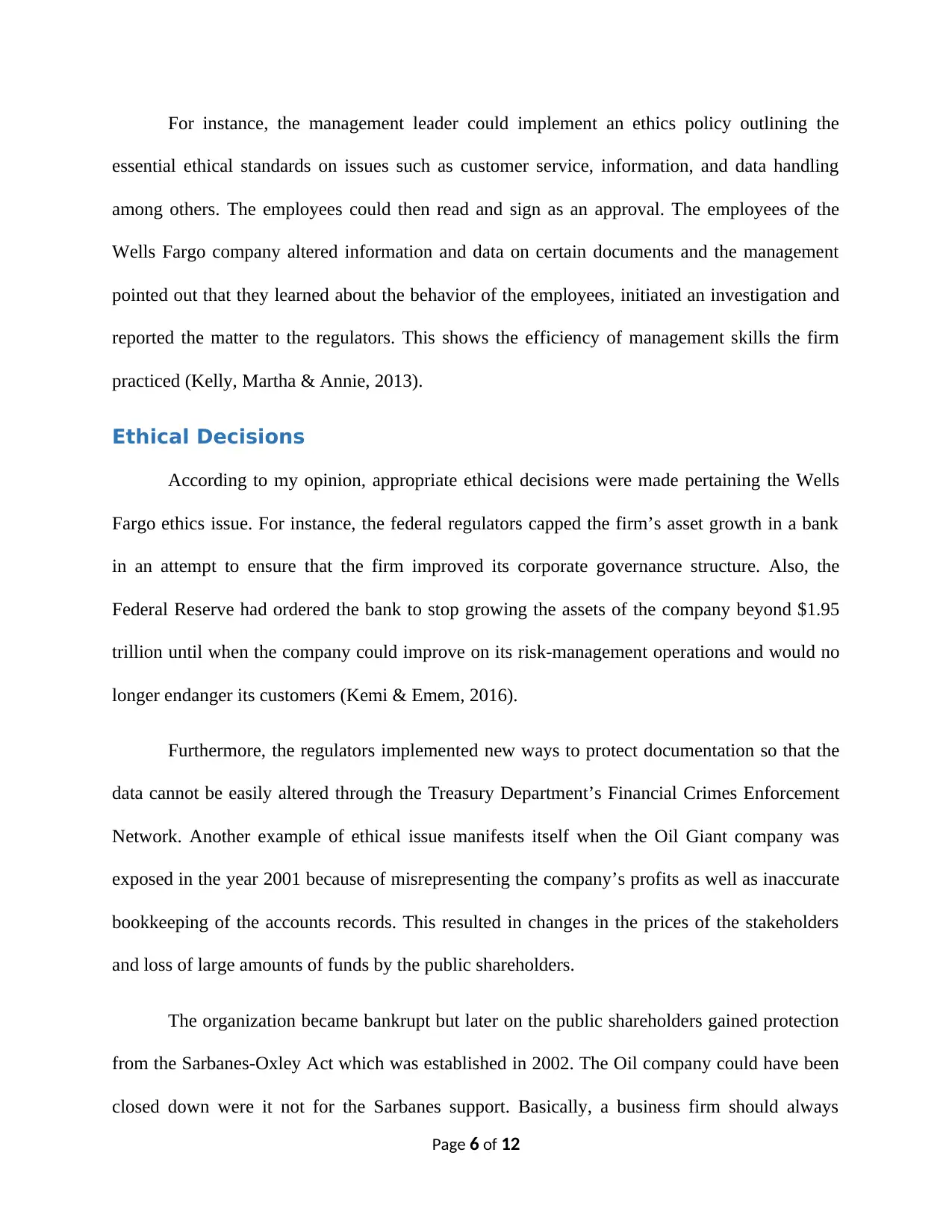
For instance, the management leader could implement an ethics policy outlining the
essential ethical standards on issues such as customer service, information, and data handling
among others. The employees could then read and sign as an approval. The employees of the
Wells Fargo company altered information and data on certain documents and the management
pointed out that they learned about the behavior of the employees, initiated an investigation and
reported the matter to the regulators. This shows the efficiency of management skills the firm
practiced (Kelly, Martha & Annie, 2013).
Ethical Decisions
According to my opinion, appropriate ethical decisions were made pertaining the Wells
Fargo ethics issue. For instance, the federal regulators capped the firm’s asset growth in a bank
in an attempt to ensure that the firm improved its corporate governance structure. Also, the
Federal Reserve had ordered the bank to stop growing the assets of the company beyond $1.95
trillion until when the company could improve on its risk-management operations and would no
longer endanger its customers (Kemi & Emem, 2016).
Furthermore, the regulators implemented new ways to protect documentation so that the
data cannot be easily altered through the Treasury Department’s Financial Crimes Enforcement
Network. Another example of ethical issue manifests itself when the Oil Giant company was
exposed in the year 2001 because of misrepresenting the company’s profits as well as inaccurate
bookkeeping of the accounts records. This resulted in changes in the prices of the stakeholders
and loss of large amounts of funds by the public shareholders.
The organization became bankrupt but later on the public shareholders gained protection
from the Sarbanes-Oxley Act which was established in 2002. The Oil company could have been
closed down were it not for the Sarbanes support. Basically, a business firm should always
Page 6 of 12
essential ethical standards on issues such as customer service, information, and data handling
among others. The employees could then read and sign as an approval. The employees of the
Wells Fargo company altered information and data on certain documents and the management
pointed out that they learned about the behavior of the employees, initiated an investigation and
reported the matter to the regulators. This shows the efficiency of management skills the firm
practiced (Kelly, Martha & Annie, 2013).
Ethical Decisions
According to my opinion, appropriate ethical decisions were made pertaining the Wells
Fargo ethics issue. For instance, the federal regulators capped the firm’s asset growth in a bank
in an attempt to ensure that the firm improved its corporate governance structure. Also, the
Federal Reserve had ordered the bank to stop growing the assets of the company beyond $1.95
trillion until when the company could improve on its risk-management operations and would no
longer endanger its customers (Kemi & Emem, 2016).
Furthermore, the regulators implemented new ways to protect documentation so that the
data cannot be easily altered through the Treasury Department’s Financial Crimes Enforcement
Network. Another example of ethical issue manifests itself when the Oil Giant company was
exposed in the year 2001 because of misrepresenting the company’s profits as well as inaccurate
bookkeeping of the accounts records. This resulted in changes in the prices of the stakeholders
and loss of large amounts of funds by the public shareholders.
The organization became bankrupt but later on the public shareholders gained protection
from the Sarbanes-Oxley Act which was established in 2002. The Oil company could have been
closed down were it not for the Sarbanes support. Basically, a business firm should always
Page 6 of 12
⊘ This is a preview!⊘
Do you want full access?
Subscribe today to unlock all pages.

Trusted by 1+ million students worldwide
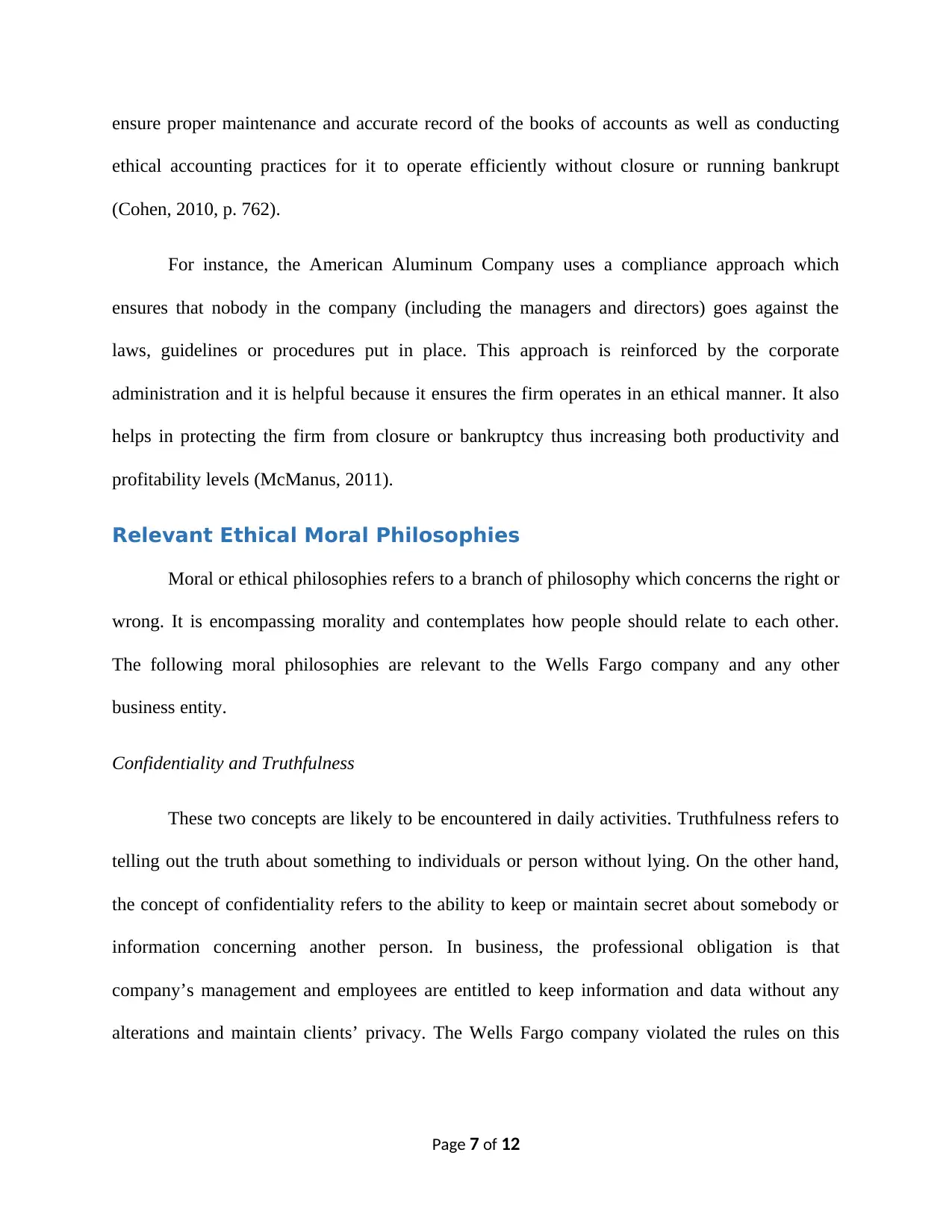
ensure proper maintenance and accurate record of the books of accounts as well as conducting
ethical accounting practices for it to operate efficiently without closure or running bankrupt
(Cohen, 2010, p. 762).
For instance, the American Aluminum Company uses a compliance approach which
ensures that nobody in the company (including the managers and directors) goes against the
laws, guidelines or procedures put in place. This approach is reinforced by the corporate
administration and it is helpful because it ensures the firm operates in an ethical manner. It also
helps in protecting the firm from closure or bankruptcy thus increasing both productivity and
profitability levels (McManus, 2011).
Relevant Ethical Moral Philosophies
Moral or ethical philosophies refers to a branch of philosophy which concerns the right or
wrong. It is encompassing morality and contemplates how people should relate to each other.
The following moral philosophies are relevant to the Wells Fargo company and any other
business entity.
Confidentiality and Truthfulness
These two concepts are likely to be encountered in daily activities. Truthfulness refers to
telling out the truth about something to individuals or person without lying. On the other hand,
the concept of confidentiality refers to the ability to keep or maintain secret about somebody or
information concerning another person. In business, the professional obligation is that
company’s management and employees are entitled to keep information and data without any
alterations and maintain clients’ privacy. The Wells Fargo company violated the rules on this
Page 7 of 12
ethical accounting practices for it to operate efficiently without closure or running bankrupt
(Cohen, 2010, p. 762).
For instance, the American Aluminum Company uses a compliance approach which
ensures that nobody in the company (including the managers and directors) goes against the
laws, guidelines or procedures put in place. This approach is reinforced by the corporate
administration and it is helpful because it ensures the firm operates in an ethical manner. It also
helps in protecting the firm from closure or bankruptcy thus increasing both productivity and
profitability levels (McManus, 2011).
Relevant Ethical Moral Philosophies
Moral or ethical philosophies refers to a branch of philosophy which concerns the right or
wrong. It is encompassing morality and contemplates how people should relate to each other.
The following moral philosophies are relevant to the Wells Fargo company and any other
business entity.
Confidentiality and Truthfulness
These two concepts are likely to be encountered in daily activities. Truthfulness refers to
telling out the truth about something to individuals or person without lying. On the other hand,
the concept of confidentiality refers to the ability to keep or maintain secret about somebody or
information concerning another person. In business, the professional obligation is that
company’s management and employees are entitled to keep information and data without any
alterations and maintain clients’ privacy. The Wells Fargo company violated the rules on this
Page 7 of 12
Paraphrase This Document
Need a fresh take? Get an instant paraphrase of this document with our AI Paraphraser
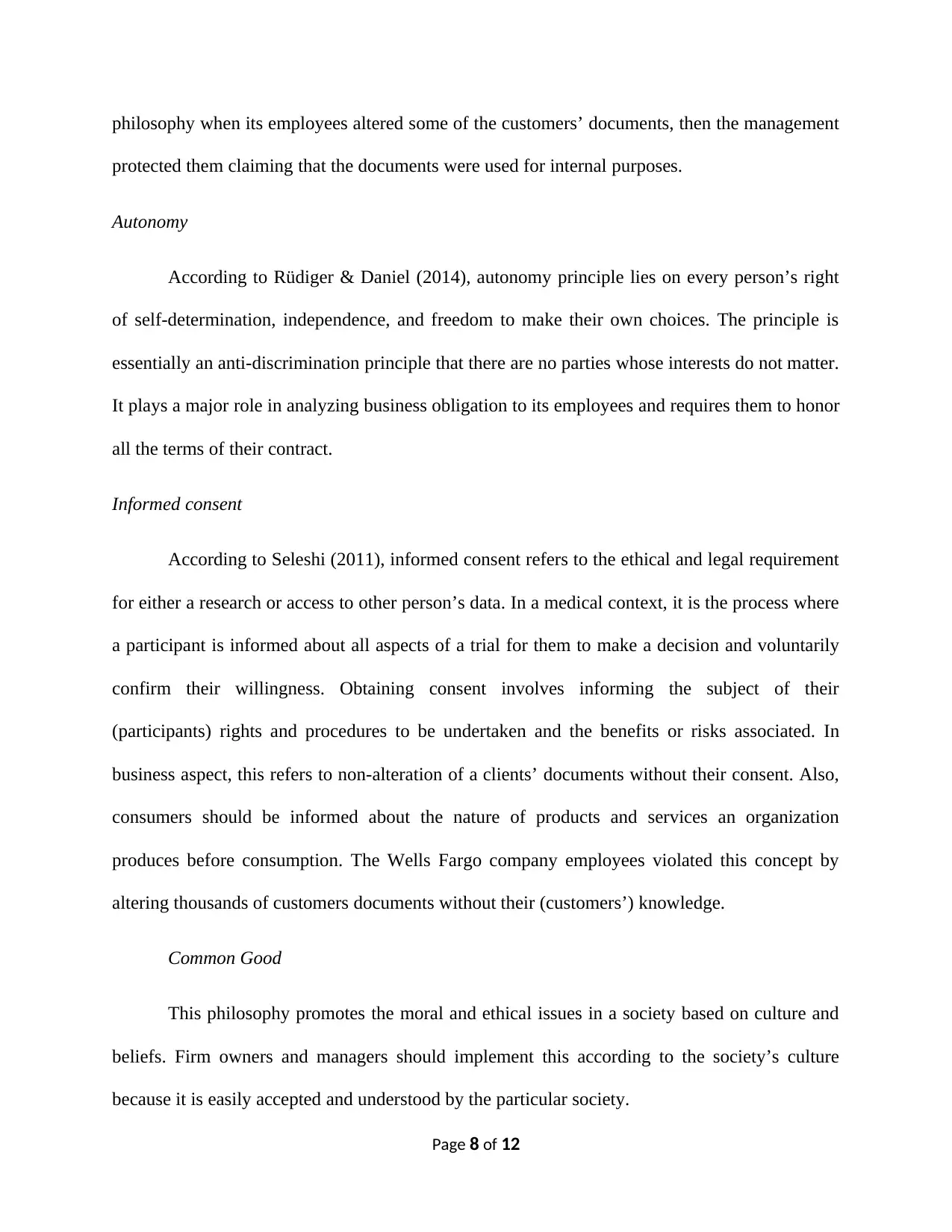
philosophy when its employees altered some of the customers’ documents, then the management
protected them claiming that the documents were used for internal purposes.
Autonomy
According to Rüdiger & Daniel (2014), autonomy principle lies on every person’s right
of self-determination, independence, and freedom to make their own choices. The principle is
essentially an anti-discrimination principle that there are no parties whose interests do not matter.
It plays a major role in analyzing business obligation to its employees and requires them to honor
all the terms of their contract.
Informed consent
According to Seleshi (2011), informed consent refers to the ethical and legal requirement
for either a research or access to other person’s data. In a medical context, it is the process where
a participant is informed about all aspects of a trial for them to make a decision and voluntarily
confirm their willingness. Obtaining consent involves informing the subject of their
(participants) rights and procedures to be undertaken and the benefits or risks associated. In
business aspect, this refers to non-alteration of a clients’ documents without their consent. Also,
consumers should be informed about the nature of products and services an organization
produces before consumption. The Wells Fargo company employees violated this concept by
altering thousands of customers documents without their (customers’) knowledge.
Common Good
This philosophy promotes the moral and ethical issues in a society based on culture and
beliefs. Firm owners and managers should implement this according to the society’s culture
because it is easily accepted and understood by the particular society.
Page 8 of 12
protected them claiming that the documents were used for internal purposes.
Autonomy
According to Rüdiger & Daniel (2014), autonomy principle lies on every person’s right
of self-determination, independence, and freedom to make their own choices. The principle is
essentially an anti-discrimination principle that there are no parties whose interests do not matter.
It plays a major role in analyzing business obligation to its employees and requires them to honor
all the terms of their contract.
Informed consent
According to Seleshi (2011), informed consent refers to the ethical and legal requirement
for either a research or access to other person’s data. In a medical context, it is the process where
a participant is informed about all aspects of a trial for them to make a decision and voluntarily
confirm their willingness. Obtaining consent involves informing the subject of their
(participants) rights and procedures to be undertaken and the benefits or risks associated. In
business aspect, this refers to non-alteration of a clients’ documents without their consent. Also,
consumers should be informed about the nature of products and services an organization
produces before consumption. The Wells Fargo company employees violated this concept by
altering thousands of customers documents without their (customers’) knowledge.
Common Good
This philosophy promotes the moral and ethical issues in a society based on culture and
beliefs. Firm owners and managers should implement this according to the society’s culture
because it is easily accepted and understood by the particular society.
Page 8 of 12
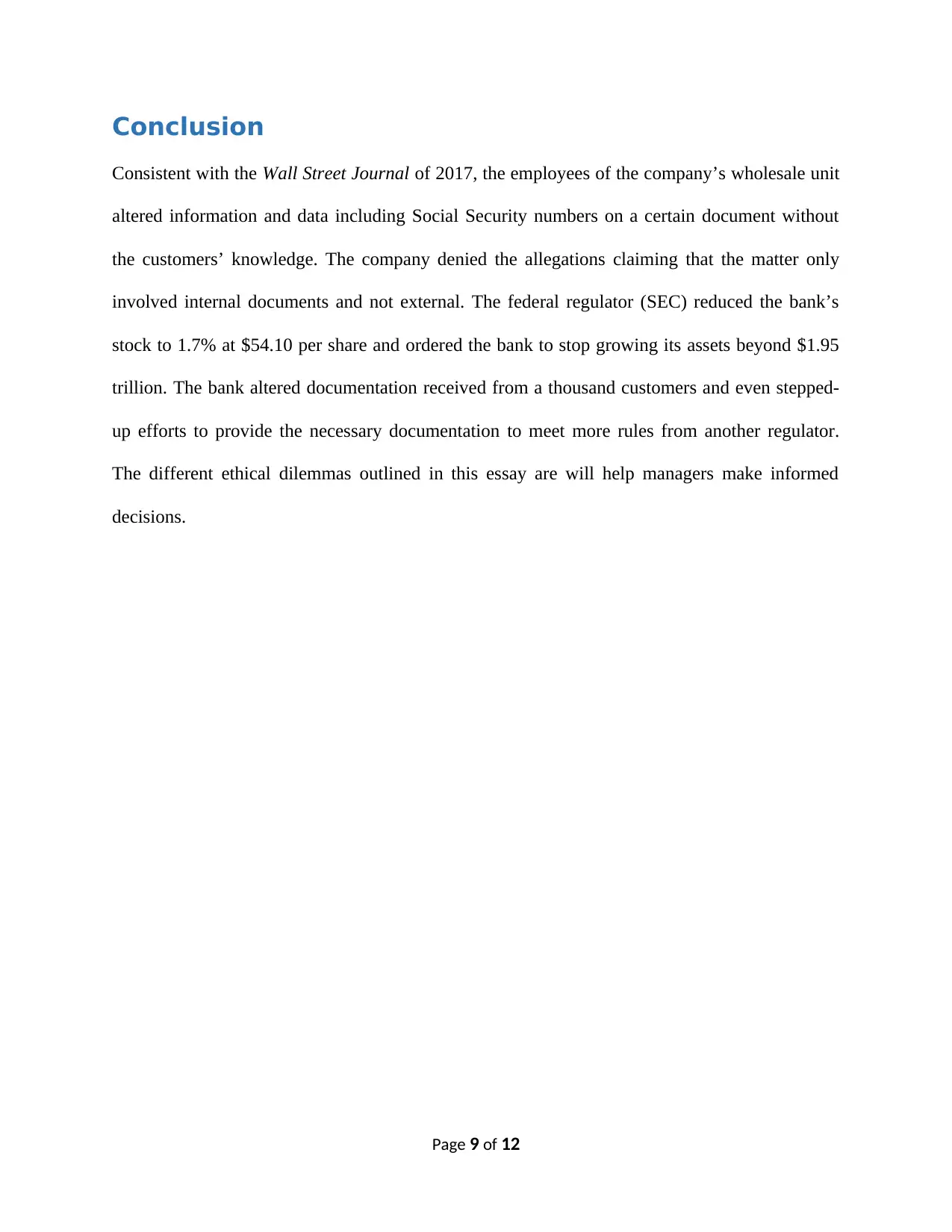
Conclusion
Consistent with the Wall Street Journal of 2017, the employees of the company’s wholesale unit
altered information and data including Social Security numbers on a certain document without
the customers’ knowledge. The company denied the allegations claiming that the matter only
involved internal documents and not external. The federal regulator (SEC) reduced the bank’s
stock to 1.7% at $54.10 per share and ordered the bank to stop growing its assets beyond $1.95
trillion. The bank altered documentation received from a thousand customers and even stepped-
up efforts to provide the necessary documentation to meet more rules from another regulator.
The different ethical dilemmas outlined in this essay are will help managers make informed
decisions.
Page 9 of 12
Consistent with the Wall Street Journal of 2017, the employees of the company’s wholesale unit
altered information and data including Social Security numbers on a certain document without
the customers’ knowledge. The company denied the allegations claiming that the matter only
involved internal documents and not external. The federal regulator (SEC) reduced the bank’s
stock to 1.7% at $54.10 per share and ordered the bank to stop growing its assets beyond $1.95
trillion. The bank altered documentation received from a thousand customers and even stepped-
up efforts to provide the necessary documentation to meet more rules from another regulator.
The different ethical dilemmas outlined in this essay are will help managers make informed
decisions.
Page 9 of 12
⊘ This is a preview!⊘
Do you want full access?
Subscribe today to unlock all pages.

Trusted by 1+ million students worldwide
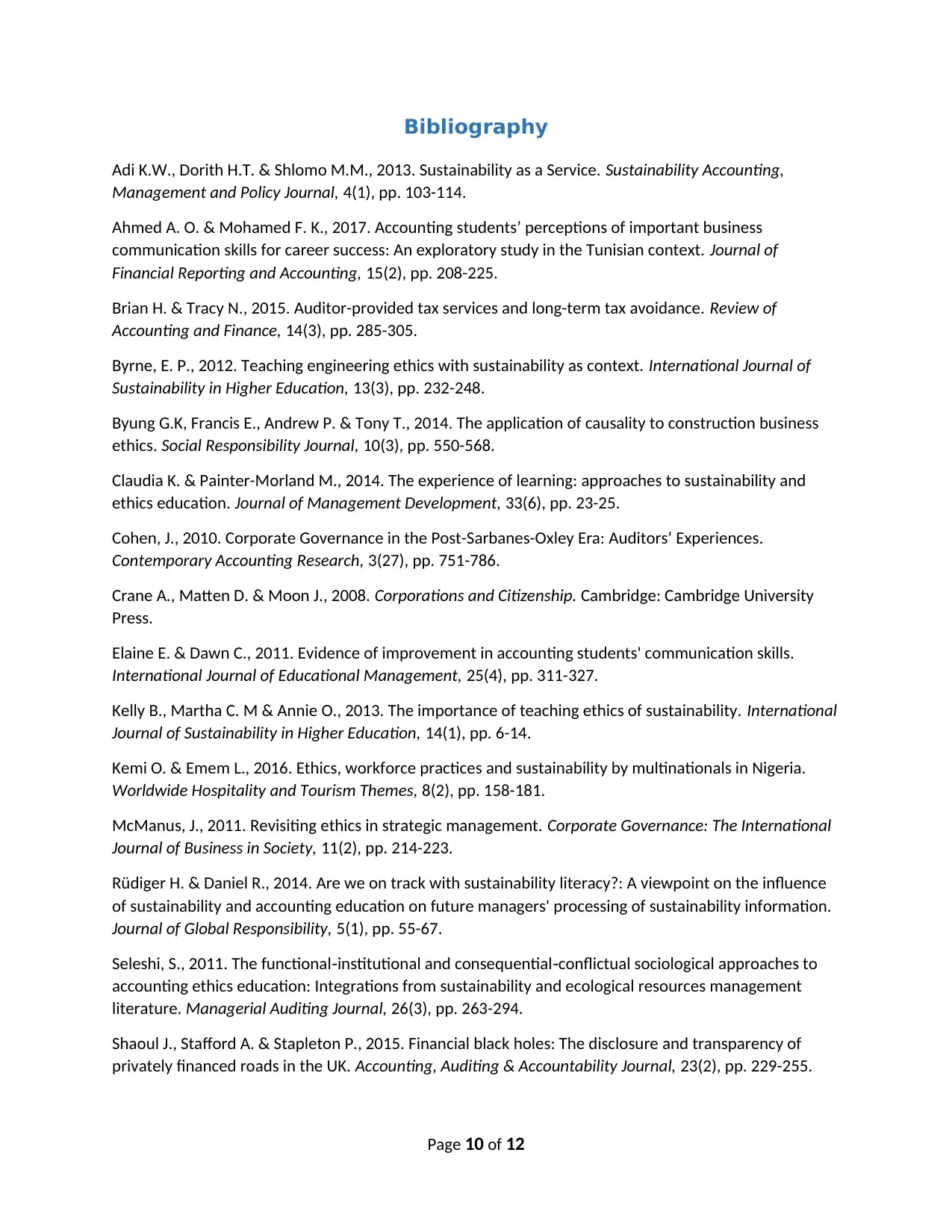
Bibliography
Adi K.W., Dorith H.T. & Shlomo M.M., 2013. Sustainability as a Service. Sustainability Accounting,
Management and Policy Journal, 4(1), pp. 103-114.
Ahmed A. O. & Mohamed F. K., 2017. Accounting students’ perceptions of important business
communication skills for career success: An exploratory study in the Tunisian context. Journal of
Financial Reporting and Accounting, 15(2), pp. 208-225.
Brian H. & Tracy N., 2015. Auditor-provided tax services and long-term tax avoidance. Review of
Accounting and Finance, 14(3), pp. 285-305.
Byrne, E. P., 2012. Teaching engineering ethics with sustainability as context. International Journal of
Sustainability in Higher Education, 13(3), pp. 232-248.
Byung G.K, Francis E., Andrew P. & Tony T., 2014. The application of causality to construction business
ethics. Social Responsibility Journal, 10(3), pp. 550-568.
Claudia K. & Painter-Morland M., 2014. The experience of learning: approaches to sustainability and
ethics education. Journal of Management Development, 33(6), pp. 23-25.
Cohen, J., 2010. Corporate Governance in the Post-Sarbanes-Oxley Era: Auditors’ Experiences.
Contemporary Accounting Research, 3(27), pp. 751-786.
Crane A., Matten D. & Moon J., 2008. Corporations and Citizenship. Cambridge: Cambridge University
Press.
Elaine E. & Dawn C., 2011. Evidence of improvement in accounting students' communication skills.
International Journal of Educational Management, 25(4), pp. 311-327.
Kelly B., Martha C. M & Annie O., 2013. The importance of teaching ethics of sustainability. International
Journal of Sustainability in Higher Education, 14(1), pp. 6-14.
Kemi O. & Emem L., 2016. Ethics, workforce practices and sustainability by multinationals in Nigeria.
Worldwide Hospitality and Tourism Themes, 8(2), pp. 158-181.
McManus, J., 2011. Revisiting ethics in strategic management. Corporate Governance: The International
Journal of Business in Society, 11(2), pp. 214-223.
Rüdiger H. & Daniel R., 2014. Are we on track with sustainability literacy?: A viewpoint on the influence
of sustainability and accounting education on future managers' processing of sustainability information.
Journal of Global Responsibility, 5(1), pp. 55-67.
Seleshi, S., 2011. The functional institutional and consequential conflictual sociological approaches to‐ ‐
accounting ethics education: Integrations from sustainability and ecological resources management
literature. Managerial Auditing Journal, 26(3), pp. 263-294.
Shaoul J., Stafford A. & Stapleton P., 2015. Financial black holes: The disclosure and transparency of
privately financed roads in the UK. Accounting, Auditing & Accountability Journal, 23(2), pp. 229-255.
Page 10 of 12
Adi K.W., Dorith H.T. & Shlomo M.M., 2013. Sustainability as a Service. Sustainability Accounting,
Management and Policy Journal, 4(1), pp. 103-114.
Ahmed A. O. & Mohamed F. K., 2017. Accounting students’ perceptions of important business
communication skills for career success: An exploratory study in the Tunisian context. Journal of
Financial Reporting and Accounting, 15(2), pp. 208-225.
Brian H. & Tracy N., 2015. Auditor-provided tax services and long-term tax avoidance. Review of
Accounting and Finance, 14(3), pp. 285-305.
Byrne, E. P., 2012. Teaching engineering ethics with sustainability as context. International Journal of
Sustainability in Higher Education, 13(3), pp. 232-248.
Byung G.K, Francis E., Andrew P. & Tony T., 2014. The application of causality to construction business
ethics. Social Responsibility Journal, 10(3), pp. 550-568.
Claudia K. & Painter-Morland M., 2014. The experience of learning: approaches to sustainability and
ethics education. Journal of Management Development, 33(6), pp. 23-25.
Cohen, J., 2010. Corporate Governance in the Post-Sarbanes-Oxley Era: Auditors’ Experiences.
Contemporary Accounting Research, 3(27), pp. 751-786.
Crane A., Matten D. & Moon J., 2008. Corporations and Citizenship. Cambridge: Cambridge University
Press.
Elaine E. & Dawn C., 2011. Evidence of improvement in accounting students' communication skills.
International Journal of Educational Management, 25(4), pp. 311-327.
Kelly B., Martha C. M & Annie O., 2013. The importance of teaching ethics of sustainability. International
Journal of Sustainability in Higher Education, 14(1), pp. 6-14.
Kemi O. & Emem L., 2016. Ethics, workforce practices and sustainability by multinationals in Nigeria.
Worldwide Hospitality and Tourism Themes, 8(2), pp. 158-181.
McManus, J., 2011. Revisiting ethics in strategic management. Corporate Governance: The International
Journal of Business in Society, 11(2), pp. 214-223.
Rüdiger H. & Daniel R., 2014. Are we on track with sustainability literacy?: A viewpoint on the influence
of sustainability and accounting education on future managers' processing of sustainability information.
Journal of Global Responsibility, 5(1), pp. 55-67.
Seleshi, S., 2011. The functional institutional and consequential conflictual sociological approaches to‐ ‐
accounting ethics education: Integrations from sustainability and ecological resources management
literature. Managerial Auditing Journal, 26(3), pp. 263-294.
Shaoul J., Stafford A. & Stapleton P., 2015. Financial black holes: The disclosure and transparency of
privately financed roads in the UK. Accounting, Auditing & Accountability Journal, 23(2), pp. 229-255.
Page 10 of 12
Paraphrase This Document
Need a fresh take? Get an instant paraphrase of this document with our AI Paraphraser
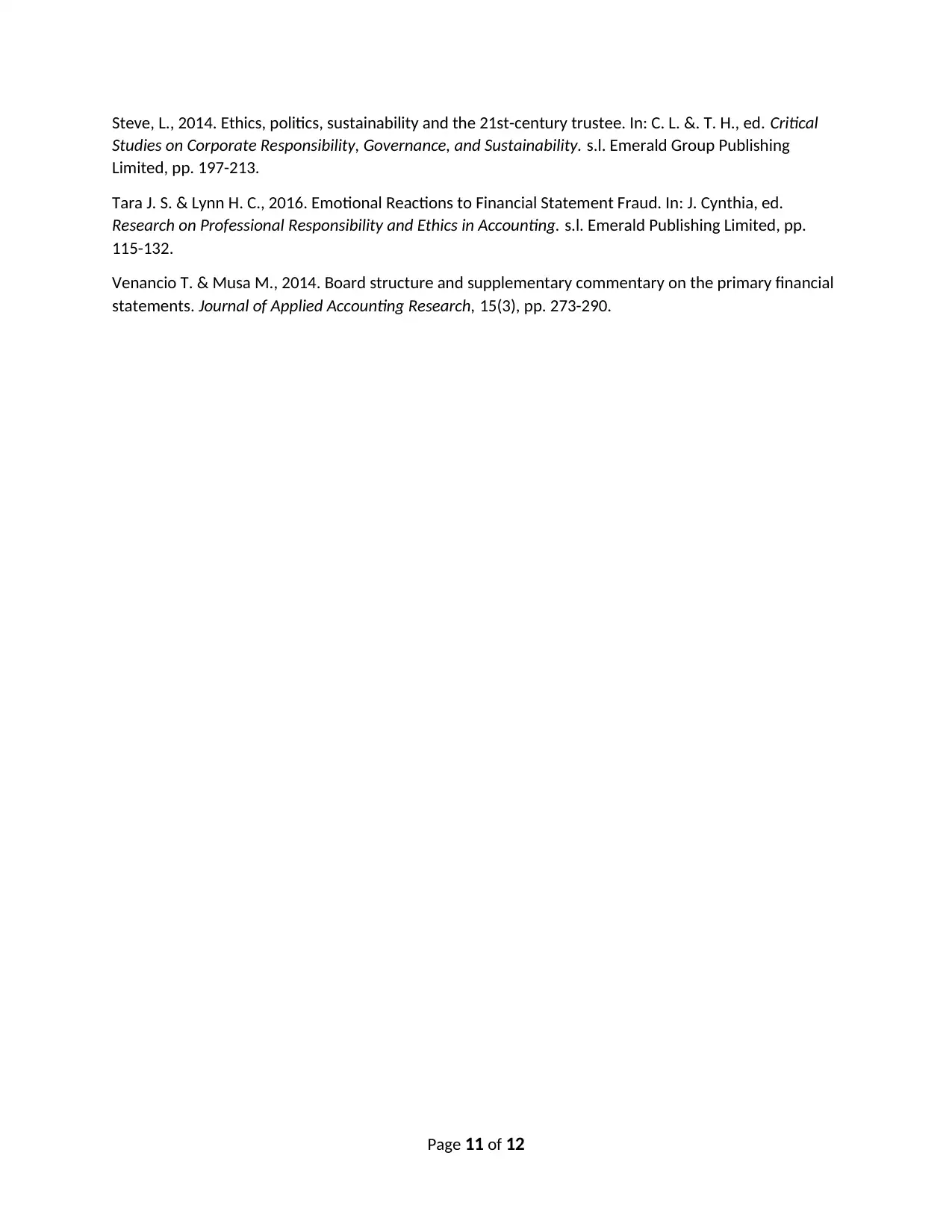
Steve, L., 2014. Ethics, politics, sustainability and the 21st-century trustee. In: C. L. &. T. H., ed. Critical
Studies on Corporate Responsibility, Governance, and Sustainability. s.l. Emerald Group Publishing
Limited, pp. 197-213.
Tara J. S. & Lynn H. C., 2016. Emotional Reactions to Financial Statement Fraud. In: J. Cynthia, ed.
Research on Professional Responsibility and Ethics in Accounting. s.l. Emerald Publishing Limited, pp.
115-132.
Venancio T. & Musa M., 2014. Board structure and supplementary commentary on the primary financial
statements. Journal of Applied Accounting Research, 15(3), pp. 273-290.
Page 11 of 12
Studies on Corporate Responsibility, Governance, and Sustainability. s.l. Emerald Group Publishing
Limited, pp. 197-213.
Tara J. S. & Lynn H. C., 2016. Emotional Reactions to Financial Statement Fraud. In: J. Cynthia, ed.
Research on Professional Responsibility and Ethics in Accounting. s.l. Emerald Publishing Limited, pp.
115-132.
Venancio T. & Musa M., 2014. Board structure and supplementary commentary on the primary financial
statements. Journal of Applied Accounting Research, 15(3), pp. 273-290.
Page 11 of 12

Appendix: Article on Wells Fargo
Page 12 of 12
Page 12 of 12
⊘ This is a preview!⊘
Do you want full access?
Subscribe today to unlock all pages.

Trusted by 1+ million students worldwide
1 out of 12
Related Documents
Your All-in-One AI-Powered Toolkit for Academic Success.
+13062052269
info@desklib.com
Available 24*7 on WhatsApp / Email
![[object Object]](/_next/static/media/star-bottom.7253800d.svg)
Unlock your academic potential
Copyright © 2020–2026 A2Z Services. All Rights Reserved. Developed and managed by ZUCOL.




